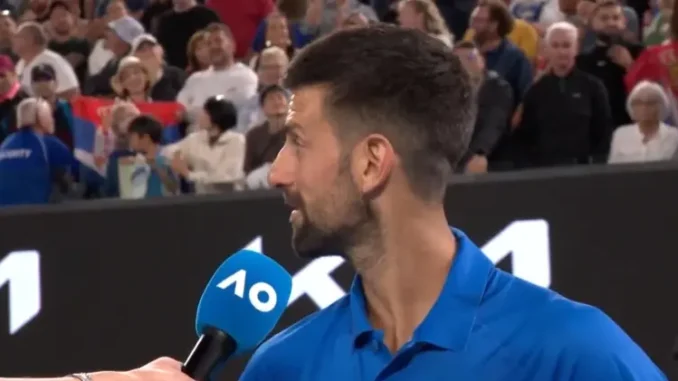
Novak Djokovic’s Vision Could Usher Tennis Into a New Era
Novak Djokovic, a name synonymous with dominance in tennis, has consistently proven to be more than just an extraordinary athlete. As a 24-time Grand Slam champion and one of the most influential figures in the sport, Djokovic has long been vocal about his vision for improving tennis for players, fans, and stakeholders alike. His innovative ideas and commitment to shaping the game’s future could help tennis enter a new era defined by inclusivity, fairness, and modernization.
Djokovic has never shied away from voicing his opinions on the issues within professional tennis. His passion for improving the sport is evident in his advocacy for changes that would benefit both the players and the overall tennis ecosystem. From pushing for better financial opportunities for lower-ranked players to calling for a reimagining of the sport’s format and structure, Djokovic’s ideas aim to create a more equitable and sustainable model.
One of Djokovic’s most significant contributions to the tennis community has been his role in founding the Professional Tennis Players Association (PTPA) in 2020. Alongside fellow player Vasek Pospisil, Djokovic co-established the organization to represent the interests of players, particularly those outside the top echelons of the sport. Unlike the existing player representation under the ATP, which also serves as a governing body, the PTPA is solely dedicated to advocating for players’ rights.
Djokovic has consistently argued that tennis needs to address the vast disparity in earnings between the top players and those ranked outside the top 100. While the sport’s superstars often enjoy lucrative sponsorships and prize money, lower-ranked players struggle to cover the costs of travel, coaching, and other expenses. Djokovic’s push for a redistribution of prize money and resources aims to make tennis a more viable career path for players at all levels.
In addition to his financial advocacy, Djokovic has proposed ideas to modernize the sport and make it more engaging for younger audiences. Recognizing the challenges tennis faces in competing with other sports and forms of entertainment, he has called for innovations such as shorter match formats and enhanced fan experiences. These changes, Djokovic believes, could attract a new generation of fans while preserving the integrity of the sport.
Another area where Djokovic’s vision could have a transformative impact is in the realm of player health and well-being. As someone who has faced his fair share of physical and mental challenges throughout his career, Djokovic understands the importance of prioritizing player welfare. He has advocated for a more balanced tournament schedule, improved medical support for players, and greater awareness around mental health issues in professional tennis.
Djokovic’s commitment to these causes stems from his own journey as a player. Rising to the top of the sport required overcoming significant obstacles, including financial hardships and the immense pressure of competing at the highest level. His experiences have shaped his perspective and fueled his desire to create a better environment for the next generation of players.
Critics of Djokovic’s initiatives often argue that his ideas could disrupt the traditional structure of tennis or challenge the authority of existing governing bodies. However, his supporters see him as a trailblazer willing to address longstanding issues that others have overlooked or ignored. The establishment of the PTPA, in particular, has been met with mixed reactions, with some viewing it as a necessary step toward fairness and others questioning its implications for the sport’s governance.
Despite the controversies surrounding his efforts, Djokovic’s vision for tennis aligns with broader trends in professional sports. Across various disciplines, there is a growing recognition of the need for structural reforms, athlete representation, and fan-centric innovations. Tennis, as one of the most globally popular sports, has the potential to lead by example in embracing these changes.
Djokovic’s influence extends beyond his ideas for reform. His on-court success and status as one of the greatest players in history give him a unique platform to drive change. As a player who has achieved virtually everything the sport has to offer, Djokovic has the credibility and authority to advocate for what he believes is best for tennis.
Moreover, Djokovic’s international background and global appeal position him as a unifying figure in a sport that spans continents and cultures. His ability to connect with fans from diverse backgrounds adds weight to his calls for a more inclusive and accessible tennis landscape.
As Djokovic continues to compete at the highest level, his role as a leader and innovator off the court is becoming increasingly significant. The ideas he champions, from financial reforms to modernization efforts, have the potential to shape the future of tennis in profound ways.
The sport stands at a crossroads, facing challenges such as evolving fan preferences, growing competition from other entertainment options, and the need for greater inclusivity. Djokovic’s vision offers a blueprint for addressing these challenges while preserving the essence of tennis. His efforts remind us that the sport’s future depends not only on the brilliance of its players but also on its ability to adapt and evolve.
As Djokovic transitions into the latter stages of his career, his legacy is already secure. Yet, his impact on tennis could extend far beyond his on-court achievements. By championing ideas that prioritize fairness, innovation, and sustainability, Djokovic is helping to lay the groundwork for a new era in the sport. Whether or not all his proposals come to fruition, his willingness to challenge the status quo and push for progress will undoubtedly leave a lasting mark on the tennis world.
In the end, Novak Djokovic’s vision is not just about changing tennis—it’s about ensuring its longevity and relevance for generations to come. By addressing the needs of players, fans, and the broader community, he is paving the way for a brighter and more inclusive future for the sport he loves.
Leave a Reply